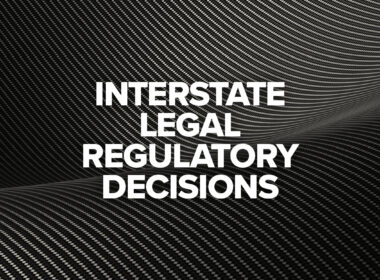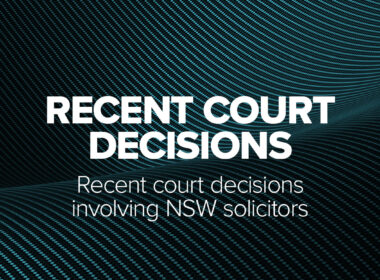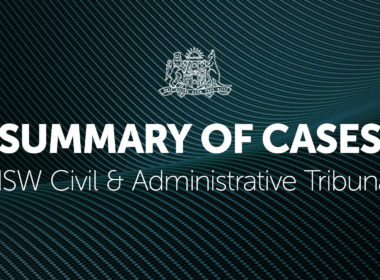The following are recent court decisions involving NSW solicitors
Council of the Law Society of New South Wales v Green [2022] NSWCA 257
Decision Published: 14 December 2022
View this decision on NSW Case Law here.
On 14 December 2022, the New South Wales Court of Appeal (Court of Appeal) published its decision in proceedings that the Council of the Law Society of New South Wales (Law Society Council) commenced against Mrs Barbara Green.
In the proceedings, the Law Society Council sought a declaration that Mrs Green is not a fit and proper person to remain on the Roll, an order removing her name from the Roll and an order requiring her to pay the Law Society Council’s costs of the proceedings. It sought that declaration and those orders on the basis that Ms Green:
- was convicted of, and sentenced to a term of imprisonment for, obtaining financial advantage by deception;
- mishandled trust money; and
- failed to maintain proper trust records.
The Court of Appeal made the orders that the Law Society Council sought.
With respect to Roll removal orders, the Court of Appeal held (at [68]-[72]):
“In the present case, the criminal conduct to which the respondent pleaded guilty and of which the respondent was convicted was, on any view of things, very serious criminal conduct (the misappropriation of nearly $1 million from the respondent’s clients’ trust accounts), which involved the respondent taking deliberate advantage on numerous occasions of opportunities arising out of her employment as a solicitor and the trust and confidence reposed in her as a solicitor. The offences involved significant breaches of trust and serious dishonesty. That alone, in our opinion, establishes that the respondent is not a fit and proper person to practise as a solicitor. However, the additional (uncharged) conduct reinforces this conclusion. That conduct also involved grave impropriety – repeated and intentional breaches of the professional rules imposed for the protection of client trust funds. Considered as a whole, there is no doubt as to the seriousness and deliberate nature of the respondent’s conduct.
Spigelman CJ noted in Cummins at [19]-[20] that:
Honesty and integrity are important in many spheres of conduct. However, in some spheres significant public interests are involved in the conduct of particular persons and the state regulates and restricts those who are entitled to engage in those activities and acquire the privileges associated with a particular status. The legal profession has long required the highest standards of integrity.
There are four interrelated interests involved. Clients must feel secure in confiding their secrets and entrusting their most personal affairs to lawyers. Fellow practitioners must be able to depend implicitly on the word and the behaviour of their colleagues. The judiciary must have confidence in those who appear before the courts. The public must have confidence in the legal profession by reason of the central role the profession plays in the administration of justice. Many aspects of the administration of justice depend on the trust by the judiciary and/or the public in the performance of professional obligations by professional people.
The primary public interest is in the maintenance of public confidence in the legal profession by reason of the central role the profession plays in the administration of justice (see Parente at [25]-[26] per Basten and Meagher JJA; and at [44], [49]-[50], [67] per Brereton JA).
As to whether the respondent is likely to remain unfit to practise as a solicitor for the indefinite future, the deliberate and intentional nature of the conduct and the absence of any evidence suggesting that the respondent (though remorseful) has taken steps to address the way in which she might safeguard against such conduct in the future (were she to reapply for admission) leads to the conclusion that the respondent is likely to remain unfit to practise for the indefinite future. In this regard, it may be noted that the respondent does not oppose the substantive order sought (for the removal of her name from the roll); nor does she oppose the making of the declaration sought by the Law Society. It may be unlikely that the respondent would in the future apply for readmission, given the gravity of the convicted conduct and the respondent’s age and ill-health. Nevertheless, the applicant notes that there has been no undertaking from the respondent that she will not apply for readmission.
In all the circumstances, this Court considers that it would be inimical to the reputation of the profession, and to public confidence in the integrity of the profession and the administration of justice, for the respondent’s name to remain on the roll (adopting the language of Parente at [26], [31]-[34] (per Basten and Meagher JJA), [50], [67]-[68] (per Brereton JA); Council of the Law Society of New South Wales v Jafari [2020] NSWCA 53 (Jafari) at [42] per Bell P (as his Honour then was) with whom White JA and Emmett AJA agreed); Council of the Law Society of New South Wales v Clarke [2022] NSWCA 57 (Clarke) at [10] per the Court (Basten and Macfarlan JJA and Simpson AJA). An order for the removal of the respondent’s name from the roll will therefore be made.”
Terepo v Council of the Law Society of New South Wales [2022] NSWCA 210
Decision Published: 25 October 2022
View this decision on NSW Case Law here:
On 2 July 2018, the New South Wales Civil and Administrative Tribunal (Tribunal) published a decision in which it found that Mrs Sesilia Fehoko Terepo (nee Latu) had engaged in professional misconduct and unsatisfactory professional conduct (Council of the Law Society of New South Wales v Terepo [2018] NSWCATOD 106). Relevantly, the Tribunal’s findings included a finding that Mrs Terepo was “recklessly indifferent to the possibility of monies that had been entrusted to her by clients and placed in the trust account of the Law Practice might be misappropriated, by giving access to the trust account to a person who to her knowledge was not Australian legal practitioner, an associate of the Law Practice, or an employee of the Law Practice” (Reckless Indifference Finding).
On 26 April 2019, the Tribunal published a decision in which it made an order recommending that Mrs Terepo’s name be removed from the Roll (Council of the Law Society of New South Wales v Terepo (No 2) [2019] NSWCATOD 60) on the basis of the conduct the subject of the decision published on 2 July 2018. Accordingly, the Council of the Law Society of New South Wales (Law Society Council) commenced proceedings in the Court of Appeal to seek an order removing Mrs Terepo’s name from the Roll.
Mrs Terepo subsequently appealed the two decisions of the Tribunal, submitting that the Tribunal exceeded its jurisdiction by making the Reckless Indifference Finding because that finding went beyond the allegations put to it by the Law Society Council. The Law Society Council accepted this submission and, consequently, the parties filed the following agreed orders with the Court of Appeal designed to dispose of both proceedings (Agreed Orders):
Note that the Court makes no order as to the costs of the proceedings in the Court of Appeal
On 25 October 2022, the New South Wales Court of Appeal (‘Court of Appeal’) published its decision and made the following orders which, in substance, were the same as the Agreed Orders:
(1) The Court orders that the Law Society’s summons in proceedings 2020/301529, being the proceedings for removal of Ms Terepo’s name from the Roll, be dismissed with no order as to costs.
(2) In proceedings 2021/00075408, being Ms Terepo’s appeal against the Tribunal’s orders, the Court makes the following orders:
a. Appeal allowed in relation to Ground 1 of the Amended Notice of Appeal filed on 21 October 2021.
b. Order 1 made by the New South Wales Civil and Administrative Tribunal on 2 July 2018 is set aside and in lieu thereof, the Court declares that the Appellant is guilty of professional misconduct in respect of the following conduct:
i. the Appellant misappropriated the sum of $850 withdrawn in cash on 9 December 2014 (Cash Withdrawal) from the trust account of her former law practice LMJ Lawyers (Law Practice);
ii. the Appellant caused a deficiency in the trust account of her Law Practice by the Cash Withdrawal;
iii. the Appellant breached s 255 of the Legal Profession Act 2004 by reason of the 39 withdrawals totalling $13,020.50 being made from the trust account of the Law Practice made between 3 November 2014 and 2 February 2015, including the Cash Withdrawal, and disbursing those amounts;
iv. the Appellant breached s 255A of the Legal Profession Act 2004 by making the Cash Withdrawal;
v. the Appellant breached s 264 of the Legal Profession Act 2004 in the period 20 February 2014 to 29 June 2015 in that the trust records of the Law Practice were not kept in such a manner as to disclose their true position;
vi. the Appellant breached s 263 of the Legal Profession Act 2004 in that she did not, as soon as practicable after becoming aware that there was an irregularity in the trust account of the Law Practice, give written notice of the irregularity to the Law Society;
vii. the Appellant failed to comply with the notice under s 371 of the Legal Profession Uniform Law (NSW) served on her on 30 May 2016 by failing to provide the written information and documentation sought in the Notice.
(3) Order 1 made by the Tribunal on 26 April 2019 is set aside and in lieu, the Court orders that:
a. The Appellant not be permitted to apply for a new practising certificate unless the following condition is satisfied: The Appellant must, at her own expense, undertake, complete and pass (achieving a pass mark of not less than 70% or equivalent as approved by the Director, Legal Regulation of the Law Society (Director) acting reasonably) the Ethics component of the Practical Legal Training course conducted by the College of Law and the Trust Account component of the Practice Management course conducted by the Law Society of NSW (or such other course(s) as may be approved by the Director acting reasonably).
b. The Appellant is to provide to the Director the original result notification from the provider/s of those courses.
(4) Note that the Court makes no order as to the costs of the proceedings in the Court of Appeal.




